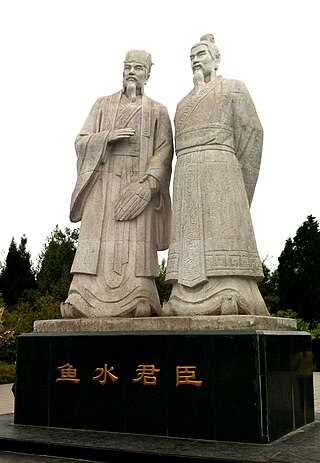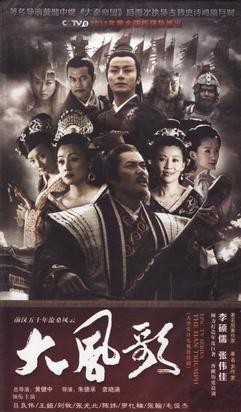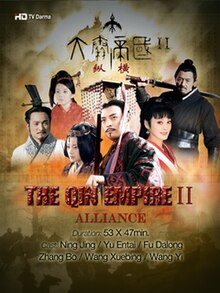
The Warring States period was an era in ancient Chinese history characterized by warfare, bureaucratic and military reform, and political consolidation. It followed the Spring and Autumn period and concluded with the wars of conquest that saw the state of Qin annex all the other contender states by 221 BC and found the Qin dynasty, the first imperial dynasty in Chinese history.

Zhao was one of the seven major states during the Warring States period of ancient China. It emerged from the tripartite division of Jin, along with Han and Wei, in the 5th century BC. Zhao gained considerable strength from the military reforms initiated during the reign of King Wuling, but suffered a crushing defeat at the hands of Qin at the Battle of Changping. Its territory included areas in the modern provinces of Inner Mongolia, Hebei, Shanxi and Shaanxi. It bordered the states of Qin, Wei, and Yan, as well as various nomadic peoples including the Hu and Xiongnu. Its capital was Handan, in modern Hebei province.

Yan was an ancient Chinese state during the Zhou dynasty. Its capital was Ji. During the Warring States period, the court was also moved to another capital at Xiadu at times.

Qin was an ancient Chinese state during the Zhou dynasty. It is traditionally dated to 897 BC. The Qin state originated from a reconquest of western lands that had previously been lost to the Xirong. Its location at the western edge of Chinese civilisation allowed for expansion and development that was not available to its rivals in the North China Plain.

Chu was an ancient Chinese state during the Zhou dynasty. Their first ruler was King Wu of Chu in the early 8th century BC. Chu was located in the south of the Zhou heartland and lasted during the Spring and Autumn period. At the end of the Warring States period it was destroyed by the Qin in 223 BC during the Qin's wars of unification.
King Huiwen of Qin, also known as Lord Huiwen of Qin or King Hui of Qin, given name Si (駟), was the ruler of the Qin state from 338 to 311 BC during the Warring States period and likely an ancestor of Qin Shi Huang. He was the first ruler of Qin to style himself "King" (王) instead of "Duke" (公).

The grand chancellor, also translated as counselor-in-chief, chancellor, chief councillor, chief minister, imperial chancellor, lieutenant chancellor and prime minister, was the highest-ranking executive official in the imperial Chinese government. The term was known by many different names throughout Chinese history, and the exact extent of the powers associated with the position fluctuated greatly, even during a particular dynasty.

The Emperor in Han Dynasty, also released under the title The Emperor Han Wu in some countries, is a 2005 Chinese historical drama television series based on the life of Emperor Wu of the Han dynasty. It uses the historical texts Records of the Grand Historian and Book of Han as its source material.

Romance of the Three Kingdoms is a Chinese television series adapted from the classical 14th century novel of the same title by Luo Guanzhong. The series was produced by China Central Television (CCTV) and was first aired on the network in 1994. It spanned a total of 84 episodes, each approximately 45 minutes long. One of the most expensive television series produced at the time, the project cost 170 million yuan. It was completed over four years and involved over 400,000 cast and crew members, including divisions of the People's Liberation Army from the Beijing, Nanjing and Chengdu military regions. Some of the dialogue spoken by characters was adapted directly from the novel. Extensive battle scenes, such as the battles of Guandu, Red Cliffs and Xiaoting, were also live-acted.

King Zhaoxiang of Qin, or King Zhao of Qin (秦昭王), born Ying Ji (Chinese: 嬴稷, was the king of Qin from 306 BC to 251 BC. He was the son of King Huiwen and younger brother of King Wu.

Three Kingdoms is a 2010 Chinese television series based on the events in the late Eastern Han dynasty and the Three Kingdoms period. The plot is adapted from the 14th century historical novel Romance of the Three Kingdoms and other stories about the Three Kingdoms period. Directed by Gao Xixi, the series had a budget of over 160 million RMB and took five years of pre-production work. Shooting of the series commenced in October 2008, and it was released in China in May 2010.

Qin's wars of unification were a series of military campaigns launched in the late 3rd century BC by the state of Qin against the other six powers remaining in China — Han, Zhao, Yan, Wei, Chu and Qi. Between 247 and 221 BC, Qin had developed into one of the most powerful of China's Seven Warring States that coalesced in the wake of the Zhou dynasty's decline, by now retaining a weak and merely ceremonial position among the warring states. In 230 BC, King Ying Zheng of Qin began the sequence of campaigns that would bring the Warring States period to a close, setting out to conquer each remaining sovereign one by one. This was completed in 221 BC with the fall of Qi, leaving the former Zhou sphere unified under a more centralized Qin control. Ying Zheng declared himself the First Emperor, or Qin Shi Huang—becoming the first sovereign over a unified China under the imperial Qin dynasty.

The Qin Empire is a 2009 Chinese television series based on Sun Haohui's novel of the same Chinese title, which romanticises the rise of the Qin state in the Warring States period under the leadership of Duke Xiao of Qin. It was produced in 2006 and first aired on television channels in China in December 2009. It was followed by three sequels: The Qin Empire II: Alliance (2012), The Qin Empire III (2017) and The Qin Empire IV (2019), which were also based on Sun Haohui's novels.

Letter 1949 is a 2008 Taiwanese drama starring Queenie Tai, Lin Yo-wei, Alien Huang, Hawick Lau. It was produced by Eastern Shine Production. The series was broadcast on free-to-air Chinese Television System (CTS) from 9 to 26 November 2008, Monday to Thursday at 20:00.

The Han Triumph, also known as Wind Ode, is a Chinese television series based on historical events in the early Han dynasty, beginning with the founding of the dynasty by Liu Bang after his triumph over Xiang Yu, and the events leading to the reign of Liu Heng. Directed by Huang Jianzhong, the series starred Ray Lui, Wang Ji, Liu Mu, Zhang Guangbei, Chen Wei and Li Qingxiang in the leading roles. It was first broadcast on CCTV-8 in China on 17 December 2011.

Tang Ming Huang is a Chinese television series based on historical events in the reign of Emperor Xuanzong of the Tang dynasty. The series was directed by Chen Jialin and starred Liu Wei as the eponymous emperor. It was first broadcast on CCTV-1 in 1990 in mainland China.
The China women's national artistic gymnastics team represents China in FIG international competitions.

The Legend of Mi Yue (Chinese: 羋月傳; pinyin: Mǐ Yuè Zhuàn; Wade–Giles: Mi3 Yüeh4 Chuan4) is a 2015 Chinese television series directed by Zheng Xiaolong and based on Jiang Shengnan's eponymous historical novel. It stars Sun Li in the title role of Mi Yue. The series aired 2 episodes daily on Beijing TV and Dragon TV from 30 November 2015 to 9 January 2016.

The King's Woman is a 2017 Chinese television series starring Dilraba Dilmurat and Vin Zhang. It is adapted from the novel The Legend of Qin: Li Ji Story (秦时明月之丽姬传). The series aired on Zhejiang TV every Monday to Wednesday, from 14 August to 4 October 2017.

The Qin Empire III is a 2017 Chinese television series based on Sun Haohui's novel of the same Chinese title, which romanticizes the events in China during the Warring States period primarily from the perspective of the Qin state under King Zhaoxiang. It was first aired on CCTV-1 in mainland China in 2017. It was preceded by The Qin Empire (2009) and The Qin Empire II: Alliance (2012) and followed by The Qin Empire IV (2019), which were also based on Sun Haohui's novels.


















